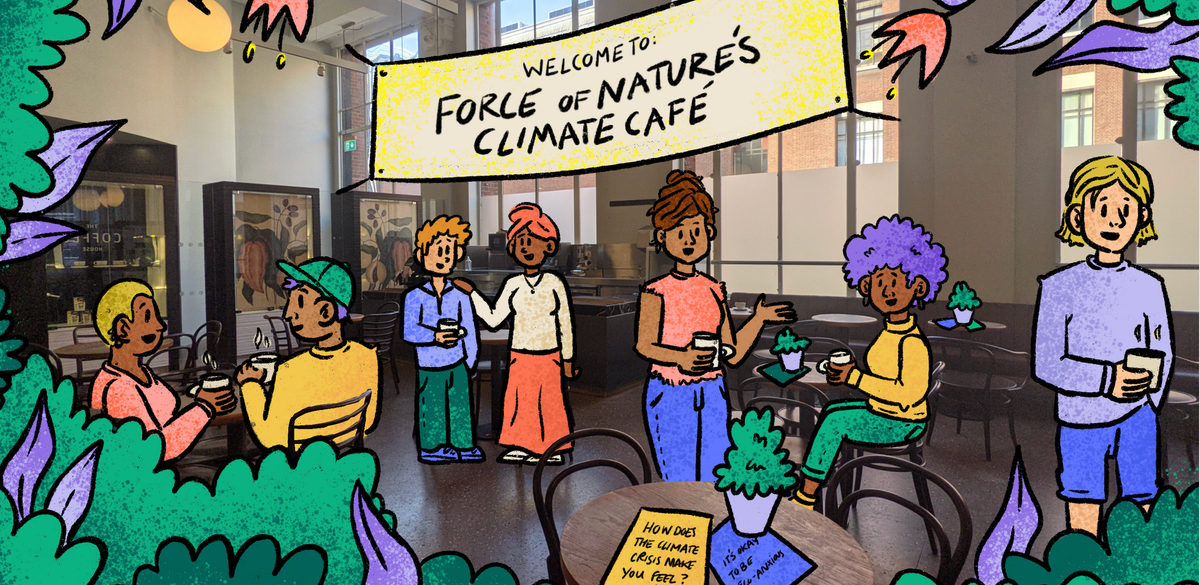Climate, Coffee, and Mental Health

My wife and I looked at each other after confronting a major project on our small farm.
“Are you overwhelmed?” she asked.
With a surge of cortisol, my shoulders tightening and chest beginning to constrict, I responded, “Oh, hell, yes.”
“Oh, sheesh, good,” she replied. “Because I am, too.”
A farm, multiple side gigs, along with regular jobs – it’s easy to get overwhelmed, if only momentarily, by the addition of another project.
For many, especially younger generations, it seems that overwhelming “project” is the foreboding anchor of climate change, and it's not momentary, but permanently ingrained.
It’s everywhere and nowhere, climate change, though its low hum is persistent even when it’s back of mind, an eco-anxiety that weighs on mental health.
So, I was quite interested to read a story about a growing movement of “climate cafes.” At their core, climate cafes are in-person or online meetups for people to share their anxieties and emotions regarding climate change. They can take many forms, from informal talks to workshops. They were modeled after “death cafes,” a concept started in Switzerland for people to gather in the community of others to discuss death and gain insights to better understand the meaning and worth of their own lives.
Talking about climate fears in the presence of others with similar anxieties seems like a practical, positive, and proven idea to me. I’m thinking about starting one here in Boise, joining 190+ other climate cafes being held in 49 countries. While the focus for many climate cafes appears to be younger generations, I figure anyone can benefit from this approach – even oldsters like me.
If you've wondered what you could do about climate change, it seems like a cup of java and a social setting might just the trick. After all, I’ll bet within the past month you’ve been in a coffee shop in the company of a friend, yes? Why not take the next step? If you’d like to buoy mental health and host a climate café in your community, you can learn more through Force of Nature, which will provide you with resources and guidance on how to successfully convene a climate café. You can also access tools from the Climate Psychology Alliance.
As an indomitable friend of mine, the late Dottie Stimpson, once said: “Nothing happens until people start talking.” I miss you, Dottie – you truly were a force of nature.
Godspeed, friends.
Russ
P.S. If you’re overwhelmed – about anything – I’d be happy to underwhelm you by talking sometime. We can have our own mini climate café or discuss anything else you’d like. Just hit reply and we’ll schedule something.
📖 Reader Response
Last week's article Save Our Sandwiches brought two reader responses we thought you might like to see.
Subscriber Emma Mattson emailed with a different possibility for the campaign's strategy, saying, "Super interesting about the tacky campaign! I agree that it's not really effective and seems to take it a little too lightly, but I think perhaps there may have been a little strategy directed at making climate change more real to "everyday" people. Folks in the flyover states may not be able to see the ice caps melting or the salmon and steelhead getting boiled in their native habitat here in Idaho, but for those less invested in the concept and impacts of climate change, losing their staples may compel them to care and/or take action."
And David Aaker, aka the Father of Modern Branding, weighed in as well with a response on LinkedIn. "Russ I agree with you on all points. It sounds like the (creative) brief was to discuss the environmental policy of Best Foods and it would be clever to clothe it in "save sandwiches." Did not work. As you point out stories would do better. Ironically, another Unilever Mayo brand Hellmann's, hit a home run with a similar brief with their Make Taste, Not Waste campaign. A winner on doing something for the environment and creating ads that went viral. Some of the best environmental ads ever in my view. The really connect. Can still see the linebacker tackle the grandmother about to throw away leftovers when they could with Hellmann's make a great meal."
💬 Quote of the Week
“The real problem of humanity is the following: We have Paleolithic emotions, medieval institutions and godlike technology. And it is terrifically dangerous, and it is now approaching a point of crisis overall.” Edward O. Wilson 🐜
🤔 Trivia Time
In 2010, Maryland became the first state in the U.S. to approve public benefit corporation (PBC) legislation. Which was the first company there to register there as a PBC?
• Big Bad Wolf
• Soft Stuff Distributors, Inc.
• Roundpeg Benefit, LLC
• Goosehead Insurance
• Skyterra Capital
Today's trivia answer can be found at the bottom of this newsletter.
Find the Most Meaningful Work of Your Career
Our partner One Work has you covered with meaningful work that goes beyond a paycheck, a cubicle, or a weekly team Zoom call. You'll find purposeful jobs like those below, along with many more at the One Work job board.
• Thrive Market - High quality organic and sustainable products are a click away at this online grocery store - the first online-only retailer to accept SNAP EBT. Senior Software Engineer - Web, REMOTE
• RALLY - Put your heart and soul to work on behalf of important causes at this advocacy agency. Senior Account Executive - Digital, Seattle, WA.
• Zevia - Are you naturally sweet? Yes? Then perhaps this soda company is the place for you. Senior Brand Strategist, Encino, CA.
Trivia Answer
If you felt the hairs stand up on the back of your neck and howled, "The Big Bad Wolf" as your answer, you're correctamundo! The DC-area pet shop was the first registered public benefit corporation (PBC) in the world.
Quick explainer: A PBC, also known as a "benefit corporation" in some states, is a legal status that gives for-profit companies the flexibility to pursue social impact alongside financial results without legal threat from investors for not maximizing shareholder value. PBCs are legally required to demonstrate the specific public benefits they are creating. This includes using a credible third-party standard to measure this benefit and in most states the publishing of an annual impact report.
